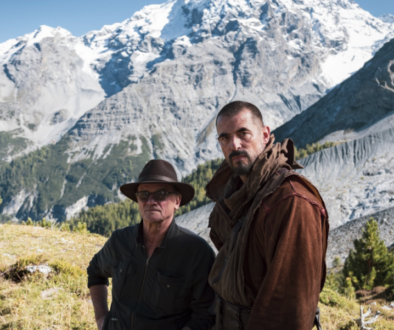
Owen Gleiberman
Chief Film Critic@OwenGleiberman
SEPTEMBER 7, 2016 | 01:36AM PT
IRA v Unionist: Colm Meaney and Timothy Spall play clashing Northern Irish leaders in a juicy bit of backseat political theater.
It’s the most die-hard formula in movies (in fact, they once made a “Die Hard” movie out of it). Two men are thrown together who really, seriously don’t like each other. One is a rule-busting rebel, the other an uptight scold, and the two are forced — usually because they’re cops — to ride around in the same vehicle. They taunt and razz and needle, and they laser in on each other’s weak points (may the best zinger win!). But because they have to spend so much time together, their hostility begins to melt — grudgingly at first, then less grudgingly than either one would care to admit. After a while, they’re working together because they have to, but also because they know they’ve got the same goal. And maybe that means that under the skin, they aren’t really so different. Deep down, they’ve come to like each other. They might even be friends! You say tomato, I saw tom-ah-to. Can you say: The eternal buddy-movie formula?
“The Journey” certainly can. It’s a movie that follows every trope in the book, and does so with pleasing fireworks and finesse. Though with one significant twist: The film’s central characters aren’t cliché Hollywood cops. They’re the true-life warrior politicians who negotiated the landmark 2006 peace agreement in Northern Ireland, winding down the Troubles to what was (in theory, at least) an official endpoint. In the scolding/conservative/uptight corner, we have Dr. Ian Paisley (played, under
pounds of make-up, by Timothy Spall), the 80-year-old founder and leader of the Democratic Unionist Party, a proudly prudish evangelical Protestant minister who would no more countenance the reunification of Ireland than he would agree to say that the earth is flat. Paisley has been battling the Irish Republican Army for close to 40 years, and he will not stand down. To him, the IRA is the Antichrist, and so is everyone in it.
In the other corner, the impish/bad-boy/rascal one, we have Martin McGuinness (Colm Meaney), the Sinn Féin MP and veteran leader of the IRA (though, of course, he won’t admit that officially), who rose up in the organization in the aftermath of Bloody Sunday, the Jan. 30, 1972 massacre in which British soldiers shot and killed 13 Northern Irish civilian protesters. He has been fighting the Unionist side since he was in his teens, and he will not stand down. To him, Ian Paisley is the Antichrist, a political and religious tyrant who stands for oppression with an iron grip. Paisley and McGuinness despise each other, and have for decades. Yet the two have never met (Paisley has refused McGuinness’ entreaties), and they have come together in St. Andrews, Scotland, to hammer out an agreement. When they first see each other, on the way to the meeting room, the soundtrack is flooded with throbbing drums to underscore the momentousness of the occasion. But this is one prizefight that both men are going to win — or they’ll both lose. And there’s a logistical quirk at play: The summit meeting overlaps the celebration of Paisley’s 50th wedding anniversary in Belfast, and he is so chivalrously devoted to his wife that he insists on going.
The representatives of the IRA have no problem with that. But McGuinness, hewing to a tradition that dictates that leaders in this conflict travel together (so that one of them can’t be singled out for attack), insists on going with Paisley. The two are placed in a car to the Glasgow airport driven by a boyish chauffeur (Freddie Highmore) who is actually an MI5 plant. The car is also rigged with surveillance apparatus that allows Tony Blair (Toby Stephens) and a handful of British and Northern Irish officials, back at summit headquarters, to witness everything that’s going on. It’s all a set-up, with the implacable Paisley as prey.
Written by Colin Bateman and directed by Nick Hamm, “The Journey,” as an opening title acknowledges, is a made-up drama about what was said that day. It’s a juicy speculative two-hander, the sort of thing that might have been made about Nixon and Mao, or Reagan and Gorbachev, or — on a smaller scale — Norman Mailer and Gore Vidal. (Come to think of it, I’d love to see any one of those movies.) The fantasy being peddled by a film like “The Journey” is that politics is personality: If we just get to know the people involved, we will touch the hidden truth of history. But in this case, the conceit really holds water, because Ian Paisley, with his stern Unionist fanaticism, was one of the architects of the Irish conflict, and an IRA freedom fighter like Martin McGuinness staked his morality on every car bomb. “These two are the Troubles,” says one official. Whether or not they can get along is, on some level, what the whole conflict is about.
For a while, it’s a conversational clash from hell. Paisley, played by Spall with a shock of white hair, beetlebrows, and lips so pursed that it looks like he thinks it would be tempting fate to smile, is not a man you can cuddle up to. He’s the sort of prude who thinks that line dancing is sinful, and he hasn’t been to see a film since 1973 (and that was to lead a protest against “The Exorcist”). The movies have long made sport of uptight curmudgeons like this, but Paisley’s rigidity is no joke: In his disdain for Catholics (who, in movies, tend to be the uptight ones — here, they’re the freak-flag-flying liberals), one sees the psychological underpinnings of the conflict. To Paisley, keeping Northern Ireland under the yoke of Great Britain is a way of repressing everything — in Catholics, in the modern world – that he fears and loathes. He’s a crusty fundamentalist in a Unionist necktie, and Spall croaks out his lines with grim, snappish authority, so that he sounds like a cross between John Huston and Lionel Barrymore’s Mr. Potter in “It’s a Wonderful Life.” He’s a worldclass crank, yet so mercilessly who he is that you can’t take your eyes off him. The core thing that Paisley and McGuinness will never agree on is the very nature of the conflict. McGuinness insists that he’s fighting a civil war. Paisley won’t recognize
that — to him, McGuinness is simply a terrorist, which is why he scowlingly refers to him as “the likes of you.” So what’s the point in talking? For a while, “The Journey” is a comedy of disjunctive hostility, whether it’s the running motif of McGuinness, without a cell-phone signal, asking to borrow Paisley’s phone (he refuses) or McGuinness trying to crack the ice by making gallows-humor jokes about IRA
landmines (it doesn’t work). But then the car hits a deer and crashes into a pile of logs, stranding them all near a woods. It’s a fake accident, designed to give McGuinness more time to disarm his prey.
“The Journey” is like the political version of couple’s therapy, only without the therapist. We know that neither Paisley nor McGuinness can — or will — compromise what they think; they will not change. But as they glare at each other, stroll through the woods, then glare some more, and then wander into a nearby
church, they tick off their catechisms of belief, and just saying it all has an effect; they start to recognize each other as human beings. McGuinness replays the transformative sin of Bloody Sunday (which Paisley won’t concede) and admits that he went too far in the 1987 Remembrance Day bombing at Enniskillen (which was, in effect, the IRA’s own Bloody Sunday). At the same time, there’s a lovely moment of comic bonding — over their shared recognition of Irish insecurity as expressed in the redundancy of phrases like “so it is.”
The two actors are tart and fascinating, but Spall steals the movie, maybe because Meaney makes McGuinness too much of a mensch. His puckish humor and sorrow are affecting, but he’s such a diplomat that we never touch his anger. Then again, he’s a weary warrior. By 2006, the Troubles have raged for so long that both sides — though neither will say it — are exhausted. The movie makes the astute point that
9/11 changed everything. Suddenly, the tit-for-tat deadliness of the conflict in Northern Ireland was robbed of its propagandistic power. It seemed small — and more and more, it seemed pointless. “The Journey,” thanks to its buddy-movie structure, is destined to feel a little corny, but the movie gets at something real. It’s a celebration, by two splendid actors, of the art of political theater — and when the accord is reached, it’s because of what sly actors Paisley and McGuinness themselves turn out to be. When Paisley asks McGuinness to “apologize” for 40 years of bloodshed, he doesn’t really want the apology. It’s a gambit, a test. And maybe the reason McGuinness passes it is that he’s not trying to. Whatever did go on between these two that day, you can bet they had to engage in a mind game to disentangle themselves from the Troubles. “The Journey” is a salute to what it looks like when people get sick enough of hate that they can finally, and gratefully, let it be.
Venice Film Review: ‘The Journey’
Reviewed at Sala Grande (Venice Film Festival), September 7, 2016. MPAA Rating: Not rated.
Running time: 94 MIN.
Production
An IM Global release of a Greenroom Entertainment, Tempo Productions Limited production.
Produced by Mark Huffam, Nick Hamm, Piers Tempest, Matt Jackson, Stuart Ford.
Crew
Director: Nick Hamm. Screenplay: Colin Bateman. Camera (color, widescreen): Greg Gardiner.
Editor: Chris Gill.
With
Timothy Spall, Colm Meaney, Freddie Highmore, John Hurt, Toby Stephens.



